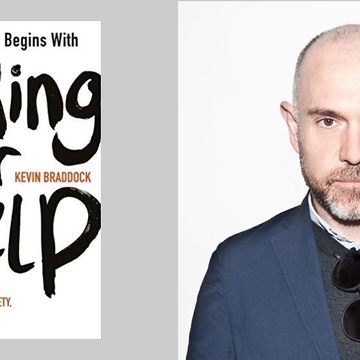In the three years since an Office for National Statistics report revealed how suicide had become the number one killer of men between 20 and 49, the perception of and conversation surrounding mental health has undergone a radical transformation.
Depression and anxiety have changed from societal taboos to issues championed by big brands like Lloyd's Bank and Ford and given visibility by hashtags trending on Twitter. Like today's #WorldMentalHealthDay, the day on which Prime Minster Theresa May announced the world's first minister for suicide prevention.
The news comes after another welcome announcement last month: statistics released by ONS showing that male suicide was at the lowest levels for 30 years with 4,382 male suicides in 2017, down from 4,508 in 2016 and 4641 in 2015.
Both developments appear cause for hope in an area that has felt increasingly hopeless, but dig a little deeper into the report and it's clear there's a still a lot of work to do to reach vulnerable people slipping through the cracks.
The report finds once again that men are three times more likely to kill themselves than women, a trend that has remained unchanged for years. It also found that the suicide rate in the UK has increased among men aged 45 to 49 by 7.4%.
This echoes a trend which a 2012 report by Samaritans titled ‘Men, Suicide and Society’ suggested is because this age cohort is "struggling to cope with major social changes" and are "in competition to meet the life-stage demands of work and relationships – a situation that is exacerbated by the current economic crisis."
Elsewhere the research points to a new and worrying trend in that teen suicides have increased 67% since 2010, showing a 15% rise in the last year alone. It mirrors other research from July which reported a staggering 107% rise in teen suicides in London, four times the national rate.
Youth workers have raised concerns that life in London is creating a “pressure-cooker” condition for young people. With many teenagers coming of age in a time of anxiety inducing social media, global political uncertainty and a long period of austerity in the UK, these numbers sadly aren’t as surprising as they should be.
As well as being a gender and age issue, suicide is very much an issue of inequality. In response to the new statistics Samaritans have called for "targeting areas with high levels of socio-economic deprivation" and want to focus on preventing suicide in particular amongst people from disadvantaged communities..
So despite an encouraging drop in the overall number of suicides, it is clearly crucial that statistics aren't manipulated into a message that the hard work is done, when the evidence shows for a poor 17-year-old in Tottenham or an out of work 52-year-old in Yorkshire things are getting worse.
One way to address the disparities between demographics is more effective targeting, like a new campaign by If U Care Share, which mobilises young people to speak about their issues to their peers. This nuanced campaigning, in place of blanket messaging for everyone aged 17 to 71, might be somewhere for the government's suicide prevention minister to start.
While the government have pledged £1.8m towards keeping the Samaritans hotline free for the next four years and announced new support teams and resources in schools, the children’s commissioner for England, Anne Longfield, argued in response that the five year-plan was too long to wait and “feels like a lifetime to a young child”.
In an interview on mental health with Esquire this month, Alastair Campbell criticised Theresa May's lack of follow through after promising to make mental health a priority in her maiden speech. "I worry the policy makers use [the dialogue around mental health] as a substitute for what they actually need to do, which is invest in the services," Campbell said. "While I hope we keep talking the talk, I wish policy makers would walk the walk more."
Fears that the new role is just lip service weren't allayed by ministers today admitting that newly appointed suicide prevention minister Jackie Doyle-Price does not yet have a firm budget or target. Health secretary Matt Hancock said the budget for her role would have to be fought for within the health budget, a revelation that inspires little confidence given the ongoing funding crisis in the NHS.
Another area that needs attention is improving the accuracy and availability of suicide data. This year a High Court ruling lowered the standard of proof required for a suicide verdict from criminal to civil. This is a huge step forward in improving the timeliness of suicide statistics and getting a more accurate picture of emerging trends. However, Samaritans are still keen to go further want a review of the death registration process to stop delays of a year or more between a death and the registration of it.
While this may not be a change people will want to shout from the rooftops or become a hashtag co-opted by supermarket adverts, it is crucial in establishing an accurate overview of the suicide crisis. Only then can we know how to truly fix it instead of cherry picking numbers to make the picture look brighter than it is.
Samaritans can be contacted on 116 123 or email jo@samaritans.org





